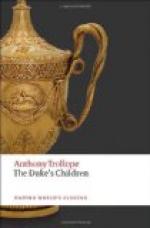could not be altered by the fact that his girl would
avenge herself upon him by dying! If such a marriage
were in itself wrong, that wrong could not be made
right by the fear of such a catastrophe. Was
it not often the case that duty required that someone
should die? And yet as he thought of it,—though
that the someone whom his mind had suggested was the
one female creature now left belonging to him,—he
put his hand up to his brow and trembled with agony.
If he knew, if in truth he believed that such would
be the result of firmness on his part,—then
he would be infirm, then must he yield. Sooner
than that, he must welcome this Tregear to his house.
But why should he think that she would die? This
woman had now asked him whether he would be willing
to break his girl’s heart. It was a frightful
question; but he could see that it had come naturally
in the sequence of the conversation which he had forced
upon her. Did girls break their hearts in such
emergencies? Was it not all romance? ’Men
have died and worms have eaten them,—but
not for love.’ He remembered it all and
carried on the argument in his mind, though the pause
was but for a minute. There might be suffering
no doubt. The higher the duties the keener the
pangs! But would it become him to be deterred
from doing right because she for a time might find
that she had made the world bitter for herself?
And were there not feminine wiles,—tricks
by which women learn how to have their way in opposition
to the judgement of their lords and masters? He
did not think that his Mary was wilfully guilty of
any scheme. The suffering he knew was true suffering.
But not the less did it become him to be on his guard
against any attacks of this nature.
‘No,’ he said at last. ’I would
not have her break her heart,—if I understand
what such words mean. They are generally, I think,
used fantastically.’
‘You would not wish to see her overwhelmed by
sorrow.’
‘Wish it! What a question to ask a father!’
’I must be more plain in my language, Duke.
Though such a marriage be distasteful to you, it might
perhaps be preferable to see her sorrowing always.’
’Why should it? I have to sorrow always.
We are told that man is born to sorrow as surely as
the sparks fly upwards.’
‘Then I can say nothing further.’
‘You think I am cruel.’
‘If I am to say what I really think I shall
offend you.’
‘No;—not unless you mean offence.’
’I shall never do that to you, Duke. When
you talk as you do now you hardly know yourself.
You think you could see her suffering and not be moved
by it. But were it to be continued long you would
give way. Though we know that there is an infinity
of grief in this life, still we struggle to save those
we love from grieving. If she be steadfast enough
to cling to her affection for this man, then at last
you will have to yield.’ He looked at her
frowning, but did not say a word. ’Then
it will perhaps be a comfort for you to know that
the man himself is trustworthy and honest.’




